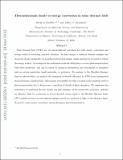Thermodynamic limits to energy conversion in solar thermal fuels
Author(s)
Strubbe, David A; Grossman, Jeffrey C
DownloadAccepted version (2.925Mb)
Terms of use
Metadata
Show full item recordAbstract
© 2018 IOP Publishing Ltd. Solar thermal fuels (STFs) are an unconventional paradigm for solar energy conversion and storage which is attracting renewed attention. In this concept, a material absorbs sunlight and stores the energy chemically via an induced structural change, which can later be reversed to release the energy as heat. An example is the azobenzene molecule which has a cis-trans photoisomerization with these properties, and can be tuned by chemical substitution and attachment to templates such as carbon nanotubes, small molecules, or polymers. By analogy to the Shockley-Queisser limit for photovoltaics, we analyze the maximum attainable efficiency for STFs from fundamental thermodynamic considerations. Microscopic reversibility provides a bound on the quantum yield of photoisomerization due to fluorescence, regardless of details of photochemistry. We emphasize the importance of analyzing the free energy, not just enthalpy, of the metastable molecules, and find an efficiency limit for conversion to stored chemical energy equal to the Shockley-Queisser limit. STF candidates from a recent high-throughput search are analyzed in light of the efficiency limit.
Date issued
2019Department
Massachusetts Institute of Technology. Department of Materials Science and EngineeringJournal
Journal of Physics Condensed Matter
Publisher
IOP Publishing